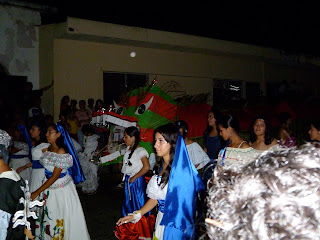Getting to know Cristóbal has been one of my joys over the last couple of weeks. He's a 20-year-old from San José Villanueva who showed up at our eye surgery mission one day in hopes of getting some help for his bad eye. Our ophthalmologists quickly saw retinal damage, and recommended that he see a retinal specialist. I made an appointment for him with Dr. Solorzano and met him in the doctor's office, which was a challenge to find (it's in an area where one-way streets and diagonals and dead-ends make nonsense of one's rational driving plan). Once I got there, Cristóbal and I settled into conversation, and I quickly found out that he speaks excellent English.
It's not because he's lived in the states or had native speakers for teachers. But a visitor from New Hampshire sent him a set of ESL CDs, and he worked and worked with them. He must have done that work with great determination and great ability, because at this point, halfway through his first year at the University of El Salvador (he's majoring in modern languages, studying English and French as well as his native Spanish) he's very comfortable and skilled in conversational English.
We had a lot of time to speak English together, as Cristóbal had to get his eyes dilated, a process that always takes quite a bit of time, and then we waited for Dr. Solorzano - who turned out also to have excellent English, due to five years in the U.S. specializing in retinal and glaucoma problems. He quickly diagnosed Cristóbal with a detached retina - but the damage had happened four years ago, and there wasn't much likelihood of recuperating sight in the damaged left eye. He recommended a laser surgery to prevent any additional damage to the left eye and to insure that the retina in the right eye would not become detached.
Happily, that meant coming back for the surgery itself, which happened in Dr. S's office, and another two hours of English conversation with this talented young man (he also plays piano with a local group). The surgery hurt, which I hadn't expected - Cristóbal had a fierce headache as well as pain in the eyes - so he was quiet as I drove him home. But we'll connect again when he comes back next week for a checkup, and I look forward to more conversation in my own native tongue.
Cristóbal is one of eight children of a campesino family, the only person in his family who's ever been to a university. There's neither TV nor a radio in his home, so it's not surprising that the family didn't have the resources to get him help when the retinal detachment happened (I gather he did see one doctor, who recommended glasses). Dr. Solorzano is now one of my heroes - he waived his fee and charged only for the cost of the laser equipment. Cristóbal was sad that his vision couldn't be restored - but for someone with his bright future possibilities, it was "
vale la pena," worth the trouble, to make sure his other eye stayed good and strong - lots of books in his future, I suspect, and he'll want to enjoy reading them.




















